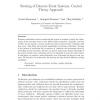Free Online Productivity Tools
i2Speak
i2Symbol
i2OCR
iTex2Img
iWeb2Print
iWeb2Shot
i2Type
iPdf2Split
iPdf2Merge
i2Bopomofo
i2Arabic
i2Style
i2Image
i2PDF
iLatex2Rtf
Sci2ools
ENTCS
2006
2006
Steering of Discrete Event Systems: Control Theory Approach
Runtime verification involves monitoring the system at runtime to check for conformance of the execution trace to user defined safety properties. Typically, run-time verifiers do not assume a system model and hence cannot predict violations until they occur. This limits the practical applicability of runtime verification. Steering is the process of predicting the occurrence of violations and preventing them by controlling system execution. Steerers can achieve this using a limited knowledge of the system model even in situations where it is infeasible to store the entire model. In this paper, we explore a control-theoretic view of steering for discrete event systems. We introduce an architecture for steering and also describe different steering paradigms. Key words: runtime correction, steering, runtime checking, control theory
| Added | 12 Dec 2010 |
| Updated | 12 Dec 2010 |
| Type | Journal |
| Year | 2006 |
| Where | ENTCS |
| Authors | Arvind Easwaran, Sampath Kannan, Oleg Sokolsky |
Comments (0)

